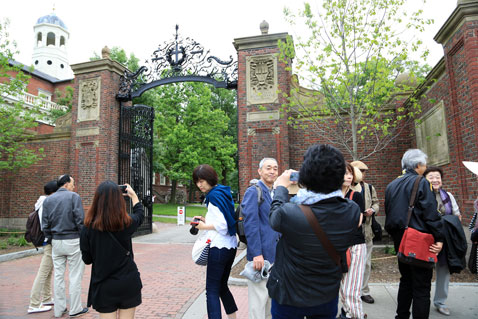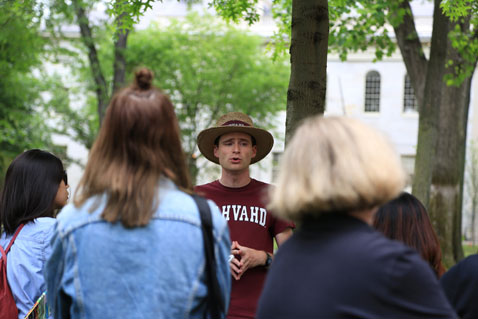Cambridge ready for increase in tourists delivered by new nonstops from China
![]()

Chinese tourists take photos at the gates of Harvard University.(Photo: Dian Zhang)
The first nonstop flight ever between Boston and mainland China arrives Friday at Logan – a 13 hour, 20 minute route flown by Hainan Airlines from Beijing. Before this, people flying from China had to transfer from another major city, such as New York or San Francisco, adding around six hours’ travel time.
China is the second-largest economy in the world, and capital city Beijing is a center of economy, technology, culture and higher education. According to Massport News, Beijing and the 32 cities around the Hainan Beijing hub represents more than 151,000 passengers and $134 million in annual revenue as of 2012. The growing number of Chinese students studying in the United States also cannot be ignored, with a report by the state’s Office of Travel & Tourism indicating 38,698 Chinese students enrolled in higher education institutions in Massachusetts in 2011.
Around 1.8 million Chinese visited the state last year, up 20 percent growth from 2012, and growth is forecast to be constant through the next few years, according to the National Travel & Tourism Office of the U.S. Department of Commerce. Chinese business visitors say in interviews that they have long called for the nonstop flights.
First stop for education tourists
In fact, Chinese people have come to Boston long before the direct flights. With elite schools such as Harvard and the Massachusetts Institute of Technology in Cambridge, it is almost the first and most important place cited by those Chinese visitors.
Shuo Wang, from Shanghai, visited the city with her husband, 3-year-old son and parents last week. “Apart from the schools, we know little about where else to do sightseeing,” Wang said.

Trademark Tours says it had about 3,000 guests in its Mandarin-language Harvard tours last year. (Photo: Dian Zhang)
Local businesses have taken action to attract Chinese tourists. Trademark Tours, a tour operator at Harvard, is the exclusive partner with Harvard Student Agencies and has hosted Chinese tourists since 2006. Noticing the demand of Chinese tourists at Harvard, Trademark launched a special tour service in Mandarin and certificate program for Chinese guests in 2011. Harvard students speaking Mandarin are hired and trained to give Chinese tourists a 1.5-hour campus tour and a 1.5-hour lecture on topics such as leadership, problem-solving and U.S. culture. Afterward, tourists get a certificate indicating the completion of a lecture in a real Harvard classroom. Until this year, the lecture had been given only in English and interpreted into Mandarin.
“Unlike folks from Texas, the Chinese tourists care less about the history of Harvard,” said Daniel Andrew, founder and owner of Trademark Tours. “They are more interested in gifts that they can take home and academic-oriented stuff like how to get into Harvard.”
Last year, Trademark had about 3,000 Chinese guests in its Mandarin tours, and the number is expected to grow this year – there have been 1,500 Chinese visitors so far by early June, and the busiest season is usually from May to September, Andrew said. Education tourism is big enough that Hainan plans daily service during the summer, up from a four-day schedule for the rest of the year.
“It’s amazing to know that Harvard is such a big brand in China,” said Andrew, mentioning that he realized the phenomenon a few years ago when he saw a Chinese woman at the Harvard Shop. The woman asked for separate bags for every single item she bought. The reason she gave Andrew: The bags themselves, with their Harvard logo, can be given away as gifts to friends back home.
Making visitors at home
Hotels around Harvard Square also spare no effort to host Chinese tourists. The Charles Hotel, for example, has developed a website in Chinese to reach out to potential customers in China and has created an account on Sina Weibo, the Chinese Twitter, for promotions and interactions with Chinese customers.
After serving so many Chinese visitors, Harvard Square Hotel knows their preferences. It is equipped with hot water dispensers for Chinese guests, because most want to make hot tea on arrival, stocks Chinese-language maps of shopping areas and restaurants and provides menus with pictures of food for reference.
“Language is a big barrier, so we are trying hard to help them avoid such troubles,” said Richard Carbone, general manager of Harvard Square Hotel, in a telephone interview.
According to Carbone, organizations such as the Cambridge Office of Tourism, Massachusetts Office of Travel & Tourism and Greater Boston Convention & Visitors Bureau have delivered several educational workshops to hotels around Harvard Square on how to serve Chinese customers through the years.
“We love it”
Shelly Xu and her parents stayed at Harvard Square Hotel the day they visited Harvard. Xu, originally from China, went to a high school in California and was admitted to Boston University this May, and Xu’s family planned to see the city before her college year starts. But instead of BU, the family chose Harvard as a first stop.
“This is our first time here in the city and we love it,” Xu’s father said. Traveling from Xi’an, a city in West China, Xu’s parents arrived in Boston through connections via Seoul in Korea, and Los Angeles.
“We are happy to know that there will be a direct flight from Beijing to Boston for our convenience,” said Xu’s father. “We’ll definitely visit my daughter more frequently in the future.”


